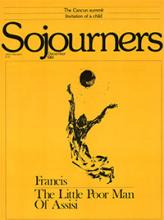I suppose my knowledge of St. Francis was like most people's. If someone had asked me, a mid-western evangelical kid from Detroit, "Who was the most famous saint?" I would have puzzled for a moment and probably ended up by saying, "Oh, yes, St. Francis." If that person had then asked me what I knew about the famous saint, I would certainly have been stumped and, at best, come up with something about him loving birds and nature. St. Francis of the birdbath endures as one of the worst caricatures of history.
Years of university and seminary education did little to correct my shallow impression of the little poor man of Assisi. (Protestant seminaries generally don't do very well with the lives of saints.) It wasn't until a few years ago, when I had the rare commodity of a free evening, that I had my first real exposure to Francis. Brother Sun, Sister Moon, the movie produced by Franco Zeffirelli, was playing for a dollar at our local cheap movie theater on a double bill with Romeo and Juliet. I had seen the teenage romance before, but had heard that the other was good.
I was completely unprepared for my first meeting with the saint. It was the beginning of an intense and often painful friendship, one that has affected me profoundly.
Now, after studying the life of Francis, the movie seems quite inadequate, with an unnecessarily romantic and ethereal quality. The real Francis, I think, was much more human and powerful than Zeffirelli's fragile and otherworldly character. But despite the film's limitations, this introduction to Francis left me overwhelmed with emotion.
Read the Full Article

